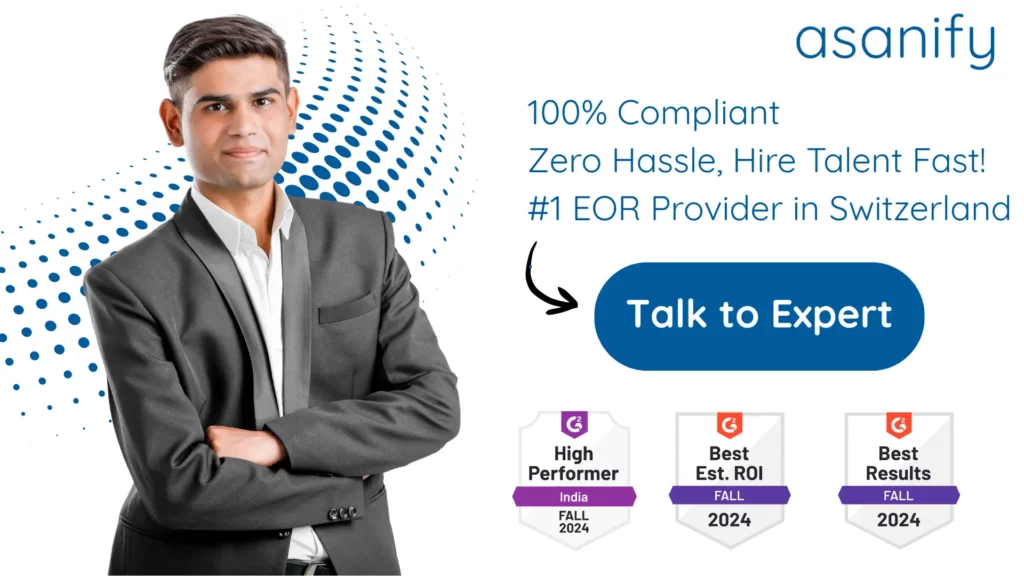Switzerland in 2025 remains a top destination for international companies due to its stable economy, business-friendly regulations, and reputation as a global hub for finance, pharmaceuticals, technology, and innovation. With its strategic location in the heart of Europe and access to both EU and global markets, Switzerland offers an attractive business environment for startups, SMEs, and multinational enterprises.
Cities like Zurich, Geneva, Basel, and Lausanne are key commercial centers with thriving sectors in banking, life sciences, high-tech, and manufacturing. The country’s strong infrastructure, low corruption, and favorable tax treaties make it highly appealing for foreign companies planning to register a business in Switzerland and establish a European presence.
This guide will help you understand market entry options, business structures, registration steps, compliance requirements, documentation, costs, challenges, and Employer of Record (EOR) alternatives for operating in Switzerland.
Table of Contents
- Exploring Your Market Entry Options in Switzerland
- Business Structures You Can Choose From
- Comparing Business Structure Options
- How to Choose the Right Business Model for Your Operations
- Step-by-Step Guide to Company Registration in Switzerland
- Key Documents Required to Register Your Swiss Company
- Post-Incorporation Essentials You Shouldn’t Ignore in Switzerland
- Additional Business Licenses and Registrations You Might Need in Switzerland
- Timeframe to Set Up a Business in Switzerland
- What Does It Cost to Incorporate a Company in Switzerland?
- Obstacles Global Founders May Face While Setting Up in Switzerland
- Incorporating as a Foreign-Owned Company: A Special Path
- Employer of Record: A Simpler Way to Hire in Switzerland Without Incorporation
- Why Asanify is the Ideal Partner for Global Companies Entering Switzerland
- Summary & Final Takeaways
- FAQs
Exploring Your Market Entry Options in Switzerland
When entering the Swiss market, companies typically consider two main approaches:
Incorporating a Local Business Entity
Forming a company in Switzerland requires registration with the Commercial Register (Handelsregister / Registre du Commerce), obtaining a tax number, and complying with labor and social security requirements. This option is ideal for businesses seeking long-term operations, hiring employees, and establishing a strong local presence.
Hiring Through an Employer of Record (EOR)
For companies looking for fast and low-risk market entry, hiring employees through an EOR allows you to operate in Switzerland without creating a legal entity. The EOR is the official employer on paper, managing payroll, taxes, and social contributions, while you retain operational control. This is perfect for market testing, short-term projects, or quickly building a small team.
Business Structures You Can Choose From
Switzerland offers several legal structures for foreign investors, each with different requirements for liability, compliance, and capital:
- Sole Proprietorship (Einzelfirma) – Simple structure for individuals, but with unlimited personal liability.
- General Partnership (Kollektivgesellschaft) – Two or more individuals share profits and have unlimited liability.
- Limited Partnership (Kommanditgesellschaft) – Includes general partners with full liability and limited partners with liability restricted to their contributions.
- Limited Liability Company (GmbH / Sàrl) – Most popular for SMEs and foreign investors; requires CHF 20,000 minimum capital and offers limited liability.
- Public Limited Company (AG / SA) – Suitable for large companies or those planning to raise public capital; requires CHF 100,000 minimum capital (CHF 50,000 paid upfront).
- Branch Office – An extension of a foreign company; not a separate legal entity but requires registration in Switzerland.
Comparing Business Structure Options
| Structure | Ownership | Liability | Minimum Capital | Compliance | Best For |
| Sole Proprietorship | 1 owner | Unlimited | None | Low | Freelancers and micro-businesses |
| General Partnership | 2+ partners | Unlimited | None | Low | Local joint ventures |
| Limited Partnership | 1+ general, 1+ limited | Mixed | None | Moderate | Partnerships with investors |
| GmbH / Sàrl | 1+ shareholders | Limited | CHF 20,000 | Moderate | SMEs and foreign subsidiaries |
| AG / SA | 1+ shareholders | Limited | CHF 100,000 | High | Large corporations and fundraising |
| Branch Office | Parent company | Parent liable | None | Moderate | Market testing for foreign companies |

How to Choose the Right Business Model for Your Operations
Selecting the right business model in Switzerland depends on your company size, liability preference, and long-term goals. Small entrepreneurs may prefer a sole proprietorship or partnership for simplicity, while SMEs and foreign investors often choose a GmbH for limited liability. Large corporations aiming for capital raising or credibility in international markets typically opt for an AG. For quick market testing or flexible hiring, a branch office or Employer of Record is the most efficient option.
Choosing the right structure depends on your business size, liability preference, and growth strategy:
- Sole proprietorships and partnerships suit freelancers or small local businesses.
- GmbH / Sàrl is the most common choice for SMEs and foreign investors due to its limited liability and flexibility.
- AG / SA is ideal for large corporations, companies planning IPOs, or raising substantial capital.
- Branch offices work well for market testing with minimal setup.
- EOR is the best option for rapid hiring and low-risk market entry without incorporation.
Suggested Read: The Complete 2025 Guide to Labour Laws in Switzerland for Global Companies
Step-by-Step Guide to Company Registration in Switzerland
- Choose the legal structure best suited to your operations.
- Reserve a company name through the Swiss Commercial Register.
- Draft Articles of Association and have them notarized.
- Deposit the required share capital in a Swiss bank account and obtain a capital confirmation certificate.
- Sign the incorporation deed before a Swiss notary.
- Submit registration to the Commercial Register (Handelsregister / Registre du Commerce).
- Obtain a Swiss Business Identification Number (UID).
- Register with tax authorities and, if required, for VAT.
- Register with social security (AHV/AVS) if hiring employees.
Key Documents Required to Register Your Swiss Company
Registering a company in Switzerland requires submitting essential documents to confirm the identity, address, and legal standing of all stakeholders. You will need passports or IDs of all shareholders and directors, proof of residential addresses, and notarized Articles of Association. A bank certificate confirming the deposit of share capital and proof of a registered Swiss office address are also mandatory. Additionally, a UBO (Ultimate Beneficial Owner) declaration is required to meet Swiss and EU compliance standards.
- Passports or IDs of all shareholders and directors
- Proof of residential address for directors and shareholders
- Articles of Association and incorporation deed (notarized)
- Bank certificate confirming share capital deposit
- Proof of registered office address in Switzerland
- UBO declaration in line with Swiss and EU regulations
Post-Incorporation Essentials You Shouldn’t Ignore in Switzerland
After incorporation, companies must fulfill ongoing compliance requirements:
- Register for VAT if annual turnover exceeds CHF 100,000
- Set up payroll and register with social security (AHV/AVS) for employee contributions
- Maintain proper accounting records and submit annual financial statements
- File corporate tax returns on time for federal, cantonal, and municipal levels
- Ensure compliance with Swiss labor laws and employee insurance requirements

Additional Business Licenses and Registrations You Might Need in Switzerland
Depending on your industry and activities, additional registrations may be required:
- Cantonal and municipal business permits for physical offices or stores
- Sector-specific licenses for finance, pharmaceuticals, healthcare, and education
- Import/export licenses and customs registrations for international trade
- Environmental and safety permits for industrial or manufacturing operations
Timeframe to Set Up a Business in Switzerland
| Step | Estimated Duration |
| Reserve company name | 1–3 business days |
| Draft and notarize Articles of Association | 2–4 business days |
| Deposit share capital and get bank confirmation | 2–5 business days |
| Register with Commercial Register | 5–10 business days |
| Obtain tax and social security registration | 3–7 business days |
| Total Time to Register | 12–25 business days |
Delays can occur due to banking procedures, notarization, or foreign document legalization.
What Does It Cost to Incorporate a Company in Switzerland?
Approximate costs for incorporation:
- Commercial Register and government fees: CHF 600–1,200
- Notary and legal fees: CHF 1,000–3,000
- Minimum share capital: CHF 20,000 for GmbH, CHF 100,000 for AG
- Accounting and compliance services: CHF 1,000–3,000 annually
- Optional sector licenses: CHF 500–2,000
Total initial setup costs usually range between CHF 3,000 and CHF 7,000, excluding share capital.
Obstacles Global Founders May Face While Setting Up in Switzerland
- High minimum share capital for AG / SA
- Requirement for notarization and certified translations for foreign documents
- Complex multi-level taxation (federal, cantonal, and municipal)
- Banking procedures that often require in-person verification
- Sector-specific licensing for regulated industries
Incorporating as a Foreign-Owned Company: A Special Path
Foreign companies can enter Switzerland through:
- Wholly-Owned Subsidiary (GmbH or AG) – Offers full control and limited liability
- Branch Office – Extension of the foreign parent company without separate legal personality
- Representative Office – For market research or liaison only; cannot generate revenue
Most sectors allow 100% foreign ownership, but banking, finance, and healthcare require additional regulatory approvals.

Employer of Record: A Simpler Way to Hire in Switzerland Without Incorporation
Entering the Swiss market does not always require establishing a local company. For global businesses testing the market, managing pilot projects, or expanding their EU presence quickly, an Employer of Record (EOR) offers a fast and fully compliant solution to hire employees in Switzerland without the cost and time of full incorporation.
Legally, the EOR serves as the official employer for your Swiss workforce. It manages employment contracts, payroll processing, tax withholdings, and social security contributions in line with Swiss labor laws. Meanwhile, your company retains complete control over employees’ daily tasks, roles, and performance management.
This approach is ideal for:
- Testing the Swiss market before committing to a permanent entity
- Launching short-term or project-based teams for sales, support, or R&D
- Hiring remote Swiss employees to integrate into global operations
- Rapid market expansion without navigating complex regulatory processes
Using an EOR also protects foreign companies from the administrative and compliance challenges of:
- Drafting Swiss-compliant employment contracts
- Registering with social security (AHV/AVS) and pension schemes
- Managing payroll and multi-level tax obligations
- Handling statutory benefits like paid leave, pensions, and insurance
By leveraging an EOR, businesses reduce the risks of non-compliance, worker misclassification, and potential labor disputes, enabling fast, flexible, and fully compliant market entry into Switzerland.
Suggested Read: EOR Switzerland: Ultimate Guide on Employer of Record 2025
Why Asanify is the Ideal Partner for Global Companies Entering Switzerland
Asanify supports global businesses with both full incorporation and EOR services in Switzerland. For companies planning long-term operations, we provide complete guidance throughout the registration process:
- Selecting the appropriate legal structure (GmbH/Sàrl, AG/SA)
- Drafting and notarizing Articles of Association and incorporation deeds
- Registering with the Swiss Commercial Register (Handelsregister / Registre du Commerce)
- Securing tax identification numbers and VAT registration
- Managing post-incorporation compliance, social security registration, and payroll setup
If you are not ready to incorporate, our Employer of Record (EOR) solution enables you to hire Swiss employees within just a few days. Asanify manages employment contracts, payroll, tax withholdings, social security contributions, and mandatory employee benefits, allowing your team to operate legally and compliantly without the administrative workload.
Asanify has successfully supported global clients across Europe, the US, the Middle East, and Asia, helping them enter the Swiss market efficiently and risk-free. Whether you are a startup testing demand or a multinational building a regional hub, our local expertise ensures your Switzerland expansion is seamless and stress-free.
Summary & Final Takeaways
Expanding into Switzerland provides excellent opportunities, but choosing the right market entry strategy is critical. Global companies typically choose between incorporating a Swiss legal entity (such as a GmbH/Sàrl or AG/SA) or hiring through an Employer of Record (EOR).
If your objective is to build a long-term presence, raise capital, or maintain complete operational control, forming a registered Swiss company is the best approach. Conversely, if your priority is rapid market entry, testing operations, or creating a small local team without administrative complexity, an EOR allows you to start quickly while staying fully compliant with Swiss labor regulations.
FAQs
It usually takes 12–25 business days depending on the structure and documentation.
Yes, Switzerland allows 100% foreign ownership of GmbH and AG companies.
CHF 20,000 for GmbH and CHF 100,000 for AG (with at least CHF 50,000 paid upfront).
Not always, but opening a bank account and signing notarial deeds often require in-person presence or a local representative.
Yes, through an Employer of Record (EOR) that handles payroll, contracts, and compliance.
Companies pay corporate income tax, VAT (if applicable), and social security contributions.
Most sectors are open, but finance, banking, and healthcare may require special approvals.
Passports of directors, Articles of Association, bank capital confirmation, and a Swiss registered office address.
High capital requirements, notarization, banking procedures, and understanding cantonal tax variations.
Using an Employer of Record (EOR) is the quickest and most compliant option for immediate hiring.
Not to be considered as tax, legal, financial or HR advice. Regulations change over time so please consult a lawyer, accountant or Labour Law expert for specific guidance.

